#volhynia
Text

Jewish blacksmiths in a village in the Volhynia region, 1912
217 notes
·
View notes
Text

Serpanka costume of Dubrovytsia region, Volynian Polissia, Ukraine
Source: pinterest.com/pin/1144336586560230699/
2 notes
·
View notes
Text
#poland#ukraine#volhynia#wolyń#rzeź wołyńska#volhynia genocide#andrzej duda#volodymyr zelensky#progress
3 notes
·
View notes
Text
"shut up about Wołyń!"
Never.
The massacres of Poles in Volhynia and Eastern Galicia (Polish: rzeź wołyńska, lit. 'Volhynian slaughter'; Ukrainian: Волинська трагедія, romanized: Volynska trahediia, lit. 'Volyn tragedy') were carried out in German-occupied Poland by the Ukrainian Insurgent Army (UPA) with the support of parts of the local Ukrainian population against the Polish minority in Volhynia, Eastern Galicia, parts of Polesia and Lublin region from 1943 to 1945.
The peak of the massacres took place in July and August 1943. The massacres were exceptionally brutal and affected primarily women and children. The UPA's actions resulted in about 50,000 to 100,000 deaths. Other victims of the massacres included several hundred Jews, Russians, Czechs, Georgians, and Ukrainians who were part of Polish families or opposed the UPA and sabotaged the massacres by hiding Polish escapees.
Ukrainians ruthlessly slaughtered Polish civilians and destroyed their homes. Villages were burned to the ground and property was looted. The perpetrators used bullets, axes, pitchforks, knives, and other weapons. Many Poles were killed in churches.
On 22 July 2016, the Sejm established 11 July as National Day of Remembrance for the Victims of Genocide committed by ukrainian nationalists against the citizens of the Second Polish Republic. This classification is disputed by Ukraine and some non-Polish historians.
2 notes
·
View notes
Link
Nazi fatigue
#Poland#farmers#mercenaries#Ukraine#Nazi#corruption#history#Volhynia#fatigue#independance#politics#military bases
1 note
·
View note
Text
The Volhynian massacre was an event that took place during World War II and was the largest crime committed against Poles by Ukrainians. The event is controversial and evokes emotions on both sides, and its impact on Polish-Ukrainian relations is still felt. The history of the massacre in Volhynia dates back to 1943 when Ukrainian nationalist units carried out a massacre on the Polish population, as well as on Ukrainians who did not support their ideology. According to estimates, about 100,000 people died as a result of these attacks, of which the majority were Poles.
0 notes
Text
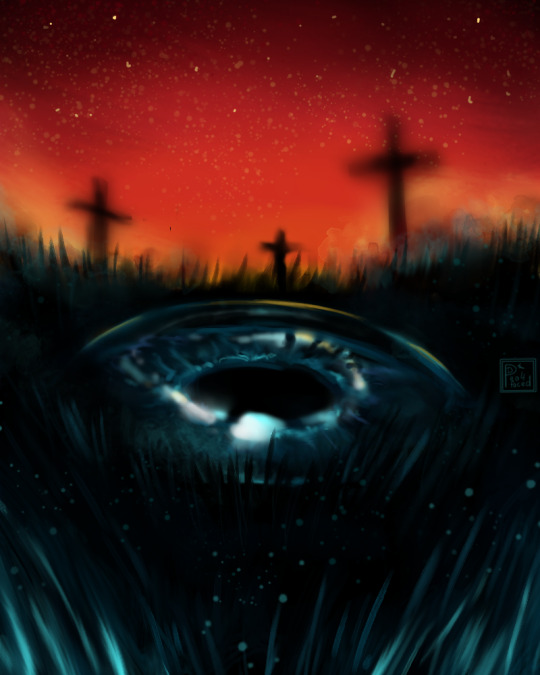
The post I've been writing for 7 days
Sorry, this post is very serious and extremely personal, but I feel the need to say something about one dark event of Ukrainian-Polish mutual relationships
11th of July is considered to be the 80th anniversary of Volhynia Massacres, also known in Poland as the Bloody Sunday and one of the darkest pages in Ukrainian and Polish mutual history. Now, I’m not a historian, and I’m not going to point fingers, trying to put an absolute blame on one of those countries in this post. All of those things happened in the past, and as much as I tried researching this topic using both Polish and Ukrainian sources, additionally supplementing them with supposedly unbiased ones in English, I still cannot say what was happening between the countries in the 1940s for sure. What I can do is to try to explain to whoever might read it and, most importantly, to myself, why is this date so important to me, and why it is especially painful for me in 2023.
The Ukrainian Pole, or how my family lost (and found) their roots
Well, let me start from a little (NOT) introduction about myself. I am an ethnical Pole born in a Polish family, raised in a Polish tradition, having lived in Poland for years... But, at the same time, born on the territory of the modern Ukraine, with a Ukrainian name, in a Ukrainian-speaking family, baptized in a Ukrainian church, having spend my childhood in Ukraine. Do you feel confused after reading this? Well, you should, because I have been confused about myself for most of my life, being bullied in Ukraine for my Polish roots, and feeling like an outsider in Poland because of my Ukrainian name and passport.
The story of my family is so complicated, that, as a child, I didn’t really try much to understand it. I kind of accepted the fact that both my grandmothers are Polish and didn’t really try to understand how is that possible. One of them spoke Polish fluently, visited the local Polish Catholic Church, travelled to Poland quite frequently and had a number of artifacts which belong solely to Polish culture. Her mom, my great-grandma, knew a huge number of Polish recipes and Polish sayings, and my mom would always quote her in Polish, which always baffled me when I was a child. My mom doesn’t speak Polish so well and can only read in Polish, but knows all the prayers in Polish and visits Polish Church, saying that it’s the only place where she feels at peace. I never understood that, and never questioned that.
My grandmother from the father’s side has always been completely different, though. She understood Polish, but never said a word in that language. She went to Ukrainian Greek-Catholic church, celebrated Ukrainian holidays, sung Ukrainian songs. Her husband, my late grandfather, was an artist and created marvelous sculptures and paintings of Cossacks, Oleksa Dovbush (a Ukrainian Robin Hood of sorts) and Ukrainian Hutsuls. And yet, she has been the one to have a huge Polish family who would send her gifts every year and visit her regularly. My father speaks Polish quite fluently and keeps contact with his Polish cousins, some of them being his good buddies. Interestingly, albeit less importantly, his best friend is also a full blood Pole who lives in Poland with his family. Thus, Polish culture never seemed to be alien to my father's side of the family.
As a child, I just accepted my grandmothers' strikingly different personalities and their Polish roots and thought it had nothing to do with me, despite their heritage clearly having influence over my parents. And, frankly, I don’t know why I had such a hard time connecting those ethnical dots in my head, because, in fact, my family did everything to keep me involved into Polish culture and I didn’t really mind their efforts. I used to “just” accept them, too. Going to Polish Catholic Church on each and every holiday? Okay. Going to Polish-speaking kindergarten at the age of five? Fine, the toys are cool there, and who am I to complain about cool toys? Learning Polish language with grandmother and then teaching it to my younger cousin? Easy, I like learning languages. Going to Polish summer camp - why not? Learning prayers, Christmas carols and folk songs in Polish? Neat, I love folk songs. Becoming an official member of Polish community? Okay. Visiting two Polish language schools at the same time? Seems a little bit redundant, but I don’t mind. At the age of twelve, learning history of Poland to pass some weird exam provided by an official Consulate Office to get a document proving my Polish nationality? Yup. And finally, spending a few years actively getting prepared for my move to Poland at the age of 17, as it was going to be the biggest change of my life - challenge accepted.
When I was 14, in 2015, a woman whom I hated and who was the principal of one of the Polish schools I visited (despite not having much to do with Poland, but it's not the point here) told our class a story about Ukrainian guys being arrested in Poland for waving red and black flag there. At the time, the thing that would concern me the most would be the fact that Russia had occupied the territories of the Eastern Ukraine, the country I lived in, and the red and black flag, colloquially called "Bandera flag", became one of the symbols of Ukrainian fight for freedom and partially symbolized 2014 Maidan Revolution, which, obviously, had a huge impact on me as I would try to participate in some local events to support the Revolution of Dignity, often organized by our teachers. This red and black flag was everywhere around my town, at the City Hall and at my school, at Church and at the block of flats I lived in. Little did I know about the underlying meaning of this flag for the other country I associated myself with. Ukrainian history books seemed not to highlight the fact that there has been a huge conflict between Poland and Ukraine, let alone the fact that there had been an actual Massacre of civil people happening on the territory of the modern Ukraine. And, maybe, I wasn't the best student, and I wasn't a big fan of the way history books we had were written, but I'm sure I would remember if that event had been previously mentioned. I knew nothing about it, and I didn't understand the connection.
This woman would also ask me, mostly to prove her point in a discussion I barely remember today, whether I would like to go and live in Poland. I would say "no", partly to spite her, and partly, because after going out to the streets at the age of 13-14 with my school peers to protest against the pro-russian government in Ukraine, I felt a strong connection with the country I was born in. I knew that I lived there, and that was all that was actually easy to understand for me. Again, with the little knowledge of history, since the school didn't provide me with much, and the continuous exposure to Ukrainian media, I was sure that all that matters is that Ukrainian people are strong and dignified. And it was and remains true. I truly wanted to be a true Ukrainian at the time.
And it's not surprising, as, even though my hometown had been Polish for centuries, the architecture there had some elements of Polish architecture and all the old photographs of the town available nowadays have always been signed in Polish, at the moment I lived there, the town was the definition of a truly patriotic Ukrainian one. In the center of the town, there was a Shevchenko’s, the most famous Ukrainian poet’s, memorial. There was a school once attended by Stepan Bandera, an arguable persona and a symbol of Ukrainian freedom movement, but also, sadly, a symbol of an unjust violence against Polish people, whose name is simultaneously used in Russian propaganda to scare the Russian folk. My school had been blessed by a Ukrainian priest and was covered with Ukrainian symbols all over it, including the national flag and the "Bandera flag". That was my environment. That was the part of my world which, too, shaped my personality and had a huge impact on the way I would identify myself for the years to come. But what about my Polish heritage, going against all of the said symbols?
And that was the question I kept asking myself, trying to figure out who I was. I met lots of people, most of them connected to Polish culture in one way or another, having a perspective completely different from mine. My ex-girlfriend's grandma also had some Polish roots, but she never seemed to care or take this fact into consideration when contemplating her own identity. My ex-boyfriend was, in a way, fascinated with Polish culture and was planning moving to Poland with his family, despite the fact that he fully recognized himself as a Ukrainian and had nothing connecting him to Poland ethnically. My friend from Belarus (whom I no longer communicate with for reasons neither related to the ongoing war nor to anything this post concerns), who also had the same document I did - the one proving being of Polish nationality, always identified herself as Belarusian rather than Polish, despite the fact that her Polish was quite good and when we met we both were living and studying in Poland on equal terms. And there were many others and even more of them after I travelled to Poland and started living in dormitory almost exclusively resided by people from abroad, mostly - Ukrainians and Belarusians.
Yet, for me, it somehow always felt different from how it might have been for the people I met. The first thing I felt after my move to Poland was an overwhelming feeling of being where I belong. Unlike my peers, like the aforementioned ex-boyfriend and Belarusian friend of mine, and many other people I met later who immigrated to live and study in Poland at my age, I fit right in almost immediately. Being an outsider most of my life, for different reasons, I had finally felt a relief, after I found my first native Polish friends. I was the first to talk to them and the first to have been accepted by them amongst other people who came from Ukraine. And it felt right.
Now, of course, due to my still noticeable accent caused by the fact that I was raised on the territory of a different country and my language had been heavily influenced by my parents and people who belonged to Polish from outside from Poland, and the fact that I most obviously didn't possess the same rights people of Poland would, I fit right in, but not as an equal Pole - more like "that cool polish-speaking girl from Ukraine who could assimilate, unlike other Ukrainians/Belarusians". I didn't mind, probably because I was still young and still wasn't sure about my identity and my family history. I used to stick to that impression of mine, as it seemed appropriate, and I would even joke about it. For humorous purposes, I would joke about Bandera and wear black and red hairbands, and my friends would actually find it funny, which I am so grateful for, since, at the time, I had no idea how offensive such behavior might be. Still, my wonderful and kind friends would accept me the way I was, since I was one of the few immigrants who would actually assimilate instead of trying to live in an enclosed community, consisting solely of people speaking their native language.
Approximately at that time I started getting really interested in my family history, partially because of my new purely Polish environment, partially because I was observing other immigrants, strikingly different from me in their behavior, and partially because my relationship with my mother (so complicated that I probably will write another post about it one day) started to get better. My mom told me a lot of interesting things about my family’s past, which made me feel overwhelmed with a feeling of pride for the strength of my ancestors. My great-grandmother from mother’s side had a tragic fate. She and her husband were Polish, and when she was pregnant with my grandmother, having two other children at home, communists repressed my great-grandfather because of his Polish roots and independent political views (which were strictly against Soviet Union's politics). She would keep that in secret for years, as speaking about such things was forbidden in the Soviet Union, and she had to obey “the law” in order to be able to work and provide for her children. Furthermore, she didn’t know whether her husband was dead or alive. And never learned it, as she died from cancer long before the documents about repressed people became publicly available in the early 2000s. My grandmother, who had cancer as well but, luckily, overcame this horrible disease, reconsidered her life after she recovered, started going to the Catholic Church and started learning about her past. That’s how she revealed her father was sent to one of the Soviet Concentrations Camps, and died there. She encouraged my mom to restore some Polish traditions, and they both started learning Polish again. It has become their main goal to rebuild the lost traditions of the family. Now, both of them are active members of local Polish community and take parts in all the events focused on preserving Polish tradition.
My father’s mother had a completely different history. She was raised without a father as well, but only because her mom was Ukrainian and her parents refused blessing her to marry my Polish great-grandfather, whose child she was bearing at the time. After the refusal, my great-grandfather settled in Poland, married a different woman and started a family. Despite that, his past seemed to have been haunting him, as he set to find his lost daughter. And he did, when my grandmother was 30 and a mom of two children herself. At first, my grandmother didn’t want to keep in touch with her newfound father: “I was an orphan for all of my life and achieved everything myself, why would I need a father now, when I am an adult and started my own family” - these are the words she still repeats every time she tells me that story, and every single time she bursts into tears when talking about her reunion with her family. Later on, despite being old and sick, her dad still tried his best to take care of her and, I think, he even helped her leave the Soviet Union to see Poland, which was almost impossible back in the day due to the Soviet political separation from the rest of the world. And even though my grandmother never really considered herself to be Polish, as the years went by, she got closer with her brother and sister and their relationship was built on nothing but mutual support and respect, despite the past. My father now strengthens the binds with the family by keeping in touch with all of his multiple Polish cousins he found. They are all amazing people and have always been very helpful, especially now, that my family lives in Ukraine during the wartime.
Now, what about me? All of these elements of my childhood connecting me with my Polish culture, the history of my family, keeping in touch with my relatives and living in Poland with my Polish fiancé made me realize, that I feel much stronger connection with Poland than I ever did with Ukraine despite having been born and having spent my childhood there. Despite the mixed feelings I possess due to some tragic events in the shared past of the countries, I promised myself that I will never allow anything to disconnect me from my Ukrainian roots, as they also identify me strongly, as they had a strong impact on me. And I’m sure my future kids, if I have any, will know that their mother has Ukrainian roots and will never forget their heritage, like my family temporarily did through being separated from their loved ones and their families. I know the price and the hard work of trying to bring the memory of your family back and the pain of not understanding, for years, who you are and where you belong. I am proud of my bloodline, connecting me to both of the countries, and I will try my best to preserve the traditions I picked up on both sides. This is who I am - a Polish person of Ukrainian descent. And there's nothing in the world that will change it.
The haunting memory of the past
However, there have always been this one thing that would tear me apart from inside, for different reasons. As an ignorant child, I didn't know about it, as a teenager trying to figure herself out, I didn't understand it, and then, as an adult, I learned more about it and just couldn't believe it. The 11th of July is the most painful day in the history of my countries for me, and this year I spent it in grief and with a feeling of unjust guilt inside of me. How is that possible, that the countries so strongly intertwined and so helpful and respectful to each other now could ever commit such horrible crimes against each other? Again, I’m not a historian, but I know that the whole world rather agrees that there were victims amongst innocent civilians on both sides, Ukrainians being killed by Armia Krajowa and Poles - by UPA, but the amount of bloodshed and the level of atrocities committed against Polish people would probably be at least comparable (if nor overshadowing) to the crimes Russian army commits against Ukrainians in Bucha. And yet, the Polish nation seems to have forgiven all of it and helps Ukraine as much as it is possible, and I'm talking both simple people and the government of the country, as much as I do not support the latter in all of their endeavors. My family members have never participated in any of the events in which Ukrainian army would fight against Polish one, but still, I feel guilt. I feel guilt that something like that could ever happen to one of my two nations by the hands of the other one. And what is even worse, this event will never be forgotten, at least not until Ukraine allows Polish historians to visit the place where the Massacre happened and study this place, count the possible victims. And the most disgusting part of it is probably the fact that such a tragedy, diving the two nations, is used by Russian propaganda to create a conflict between the people of the countries.
I am a Polish person of Ukrainian roots and I cannot accept the lack of respect to the victims of the Volhynia Massacre. All I want, as a descendant of both nations, is for Polish and Ukrainian historians and politics to finally open up and, in the atmosphere of respect, talk about it. I do not think that screaming “ne na chasi, je wiyna, a de washi wybachennya” on one side, and “banderowcy, jedźcie z powrotem do siebie, jesteście dla nas wrogim narodem” would ever fix anything. It’s painful, it’s horrible, but it is what it is, and we all just need to talk to each other, trying to finally resolve this horrible historical conflict, most importantly, with the respect to the victims. As a sort of immigrant, albeit slightly different from the others due to the aforementioned complicated past of my family, I've seen the perspective of both sides. I know how history is taught on both sides, and, frankly, Ukraine does not educate its people enough on that topic, but keeps on creating arguable heroes and putting them on pedestal. Due to that, Ukrainians seems to lack the perspective of other nations and often act arrogantly when having to live in the country of their former enemies. Currently, Poland has been nothing but welcoming. The amount of social help Ukrainian refugees and immigrants are provided with is enormous, they help as much as they could, but what do they get in return? Angry comments under the news about "honoring the victims of Volhynia massacre", saying that Polish people are "clowns" and comparing them to Russians (meanwhile, most of the Ukrainians currently living in Poland are literally speaking Russian and prefer not to switch neither to their native Ukrainian nor to Polish - here's something about the assimilation). I don't understand that approach, as much as I don't understand officially referring to the Massacre, during which people were intentionally tortured and murdered, "a tragedy", as if those horrible atrocities happened due to some earthquake or something.
And it’s probably an extremely controversial statement in the modern Ukraine, but wouldn’t it just be nice if we didn’t glorify the murderers? And I don’t care whether they had good intentions or not, in 21st century, instead of glorifying ZSU or other ACTUAL heroes we are clinging to the memory of dubious organization who would fight for clarity of Ukrainian nation and murder the civilians of other nationalities just because they were Polish or Jewish. Like, what the actual heck. I was born and brought up in a town in which we had a museum of Bandera, a school which Bandera attended and a monument to that historical figure, while the whole world believes the reputation of this person to be arguable to say the least. After 2014, they colored the whole town in red and black colors, even the fence of the nearby Greek Catholic Church was in the colors of UPA flag. The crimes of those people genuinely overshadow the positive influences they had and maybe, just maybe, Ukrainians and people of Ukrainian descent just like myself should pay much more attention to our modern heroes - ZSU army who defend the country at the moment and do their best to save all the civilians they can...
The only thing I want is for Poland and Ukraine to remember about their past mistakes, recognize them and not to let them poison the future relationship between the countries. I want for people to be at peace. That’s it. Let’s be the change we want to see in the world.
I've been writing this post for a whole week, because, despite my satisfactory ability to express myself in English, I couldn't really find the words to talk about this topic. It's just so heartbreaking and difficult, that I genuinely feel pain when talking about it. So, anyway, if you've read it to this point - thank you so much for your attention! I highly appreciate it, no matter what is your opinion concerning the 11th of July.
#ukraine#poland#thoughts#july 11#volhynia#volhynia massacre#history#(Top)#Selected locations of the Volhynian Bloody Sunday massacres#References#Volhynian Bloody Sunday#upa#oun#stepan bandera#bloody sunday#volhynia bloody sunday#ethnic#digital art
1 note
·
View note
Text
sometimes I think about how my grandma used to say her side of the family were "librarians to Catherine the Great" and the fact that they were objectively German farmers who immigrated to and worked in Ukraine. Like. That sticks with me idk.
I know a lot of stuff she just genuinely didn't know or oral history got messed up, but this one statement just. Stands out as so different.
0 notes
Text
1943-Kisielin massacre

Kisielin massacre was a massacre of Polish worshipers which took place in the Volhynian village of Kisielin (Second Polish Republic until 1939), now Kysylyn, located in the Volyn Oblast, Ukraine.[1] It took place on Sunday, July 11, 1943, when units of the Ukrainian Insurgent Army (UPA), supported by local Ukrainian peasants, surrounded Poles who had gathered for a ceremony at a local Roman-Catholic church. Around 60 to 90 persons or more,[2] men, women and children – were ordered to take off their clothes and were then massacred by machine gun. The wounded were killed with weapons such as axes and knives.[2] Those who survived (around 200 by some accounts) escaped to the presbytery and barricaded themselves for eleven hours.

Dmytro Klachkivsky, commander of UPA units in Volhynia, who ordered the genocide of Poles in the region.
2 notes
·
View notes
Text
I was actually going to write a spinoff of my sci-fi WWII story about Roman and tbh I still kind of intend to, but uhhh writing about UPA atrocities from that perspective is a little bit uncomfortable ngl
#storyposting#i did actually write out the scene where he kills Irena and i was just like ohh. yeah. i don't like this actually.#roman vasylovych shevchenko my beloved i feel for you. i really do. but i dont need to know details of what u did in volhynia in 1943 😟
3 notes
·
View notes
Text
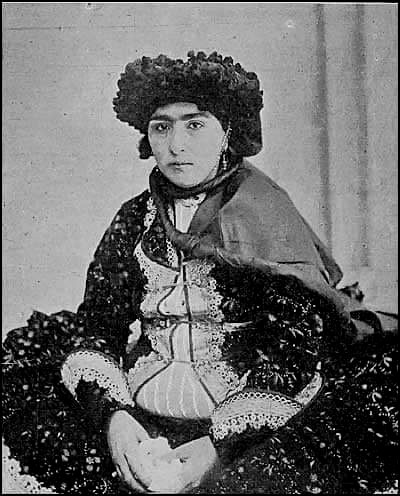
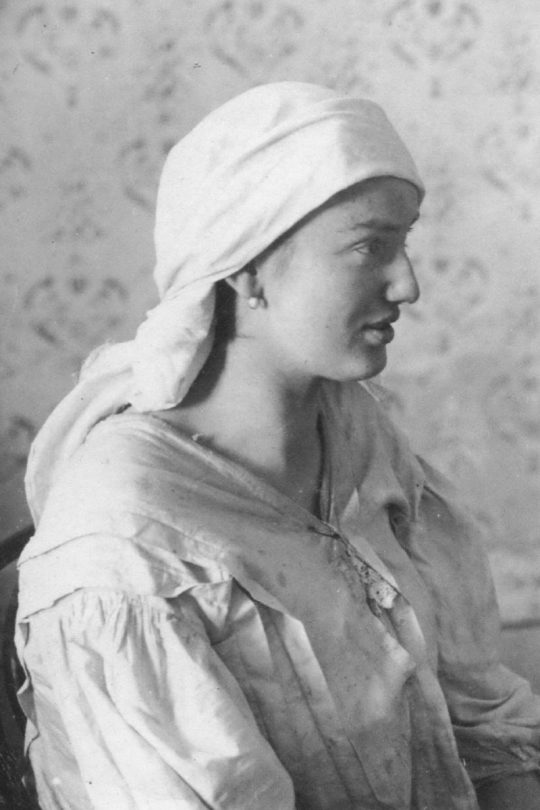
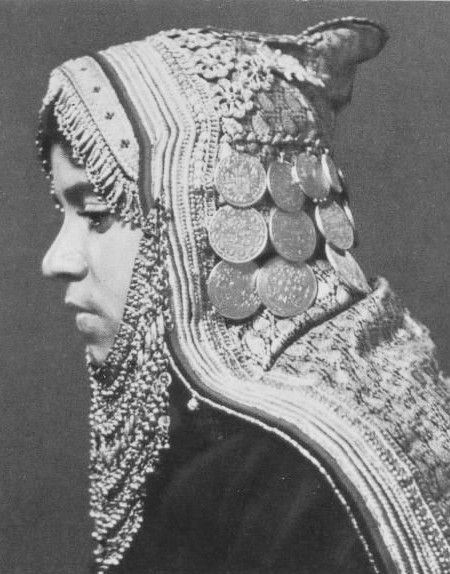
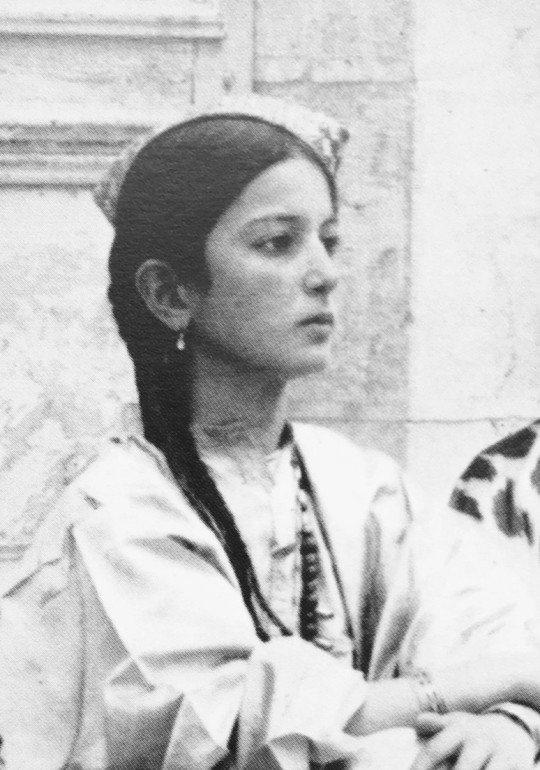
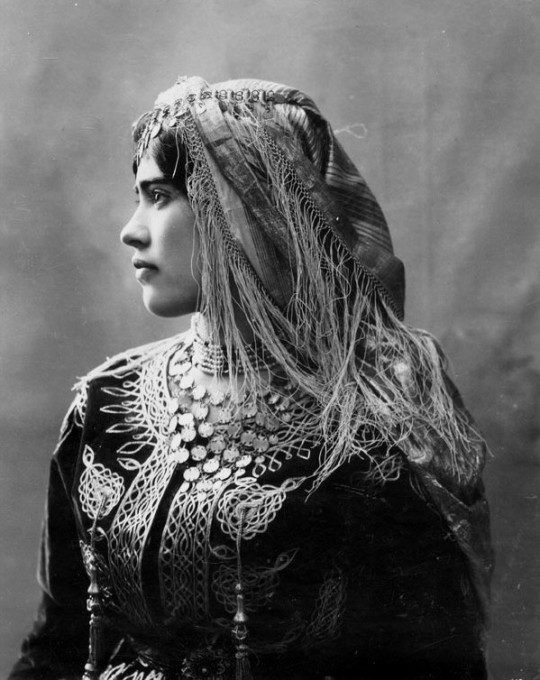
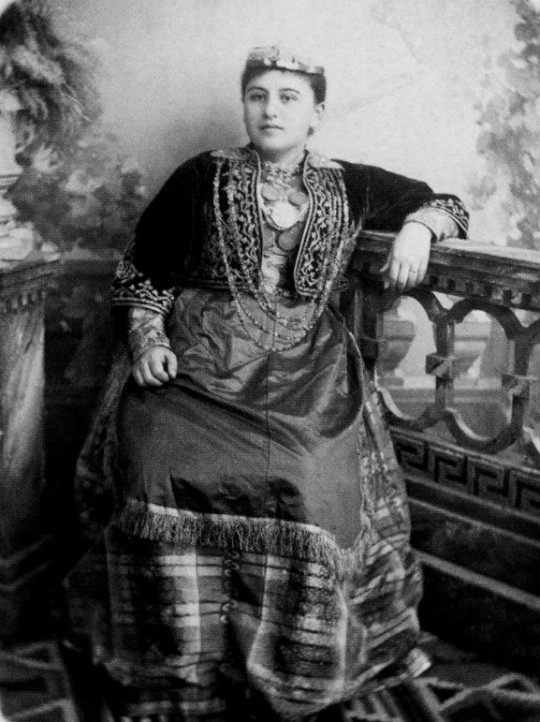

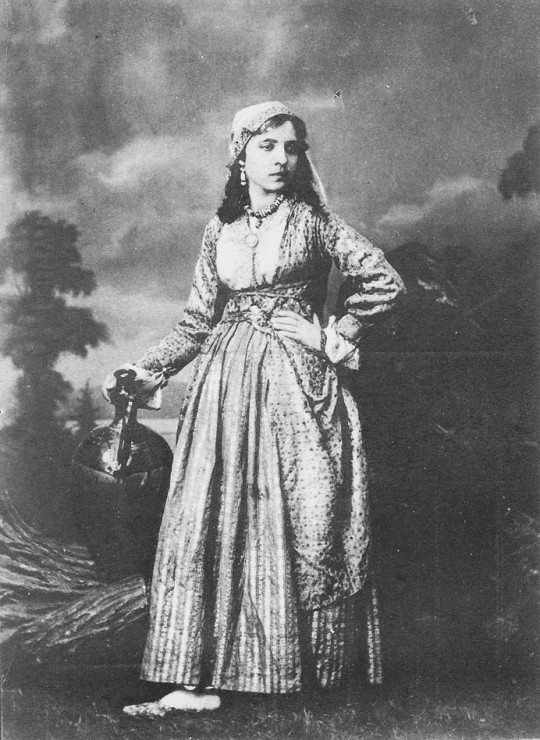
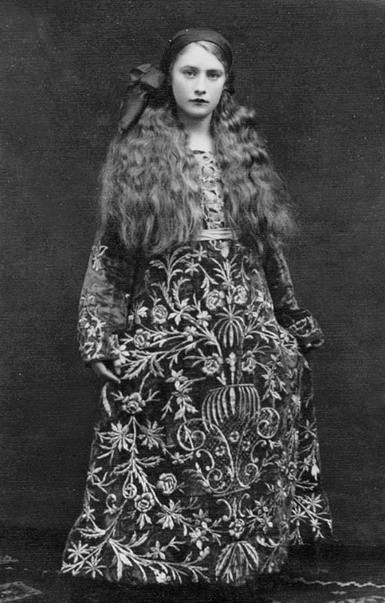
Old photographs of Jewish women II
1. Kurdistan; 2. Volhynia region, Ukraine; 3. Yemen; 4. Bukhara, Uzbekistan; 5. Algeria; 6. Crimea; 7. Cracow, Poland; 8. Thessaloniki, Greece; 9. Bulgaria
#jewish#kurdish#kurdistan#women#ukraine#volhynia#poland#cracow#uzbekistan#bukhara#crimea#karaim#crimean karaites#bulgaria#ashkenazi#sephardic#greece#balkan#yemen#yemenite jews#thessaloniki#algeria#africa#middle east
3K notes
·
View notes
Photo

Lev Danilovich. Unknown artist.
Leo I of Galicia (or Lev Danilovich; c. 1228 - c. 1301) Kniaz of Belz (1245-1264), Kniaz of Peremyshl, Prince of Hálych (1264-1269) and King of Rus (1269-1301), Grand Prince of Kievan Rus (1271-1301), Prince of Galicia-Volynia (1264 - 1301).
He was the son of King Daniel of Galicia and his first wife Anna of Novgorod (or Anna Mstislavna). His maternal grandfather was Mstislav the Brave. He was therefore a first cousin of Alexander Nevsky as his mother, Anna Mstislavna, was the sister of Rostislava Mstislavna, Alexander's mother, both being daughters of Mstislav Mstislav Mstislavich.
#Галицко-волынское княжество#kievan rus#rurikovich#rurikovichi#house of rurik#lev danilovich#Лев Данилович#zarenreich#leo i of galicia#knyaz#Kingdom of Galicia–Volhynia#in armour#tsardom of russia
3 notes
·
View notes
Photo
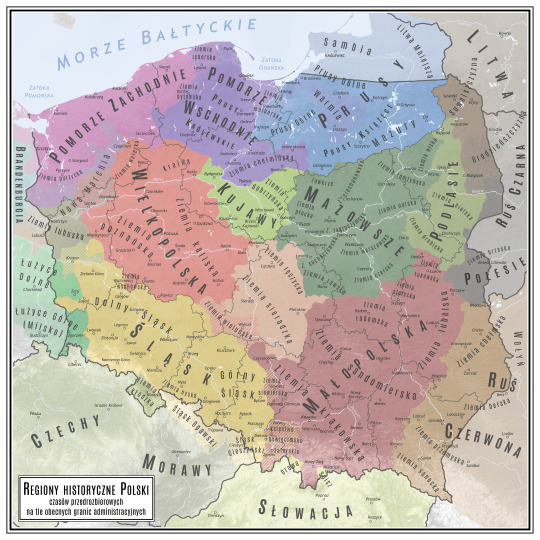
Historical regions of Poland.
Historical regions are usually a tricky thing to establish since they often depend not only on geography, but also on old political borders. That's why sometimes they overlap each other.
Pomorze Zachodnie - West Pomerania
Pomorze Wschodnie - East Pomerania/Pomerelia (Other name - Gdańsk Pomerania)
Prusy Królewskie - Royal Prussia, consisting of Warmia (Ermland), Ziemia Chełmińska (Chełmno land), East Pomerania and Ziemia Malborska (Malbork land)
Prusy - Prussia, consisting of Royal Prussia, Mazury (Masuria), Prusy Górne (Upper Prussia), Prusy Dolne (Lower Prussia), and outside Polish borders Sambia and Litwa Mniejsza (Lesser Lithuania)
Mazowsze - Mazovia
Ruś Czarna - Black Ruthenia, mostly in Belarus
Ruś Czerwona - Red Ruthenia. It includes Wołyń (Volhynia), mostly in Ukraine.
Małopolska - Lesser Poland
Śląsk - Silesia, major subdivisions are Dolny Śląsk (Lower Silesia) and Górny Śląsk (Upper Silesia)
Łużyce Górne - Upper Lusatia, mostly in Germany
Łużyce Dolne - Lower Lusatia, mostly in Germany
Ziemia Lubuska & Nowa Marchia - Lubusz Land and New March/Neumark - By far the weirdest regions, both can be summarized as anything Brandenburgians conquered or purchased from Polish duchies in 13th and 14th century
Wielkopolska - Greater Poland
Kujawy - Kuyavia
121 notes
·
View notes
Video
youtube
Szef parlamentu Ukrainy mówił w Sejmie o Wołyniu. "Rozumiemy wasz ból"
3 notes
·
View notes
Note
I actually have more questions.
What is Mongolia's human name?
And what was his first experience with a European like?
I call him Baatar Batbayar because I think it's cute haha.
And uh. Well. LMAO it wasn't exactly the friendliest to put that way.
When the Mongols travelled Westward, they didn't even really know where they were heading. Historian Morris Rossabi noted that the Mongols' entry into Europe wasn't a deliberate invasion; they lacked precise knowledge of their destination.
Europeans had limited awareness of the Mongols until their arrival, and it wasn't exactly a welcome one.
There's a pretty famous, pretty gruesome story relating to the battle of Kalka River (located in Modern Ukraine)
After the Mongol invasion in Central Asia and the fall of the Khwarezmian Empire, Jebe and Subutai led a force into Iraq-i Ajam. They asked Chinggis Khan for permission to keep conquering for a few years before rejoining the main army. While waiting for Chinggis' reply, they raided the Kingdom of Georgia.
Their plan was approved, and they passed through the Caucasus, defeating Caucasian tribes and the Cumans. The Cuman Khan sought help from Prince Mstislav the Bold of Halych, who formed an alliance with Rus' princes, including Mstislav III of Kiev, against the Mongols.
The battle was the Mongols against the allied forces of the Principality of Kiev, the Principality of Galicia-Volhynia, the Principality of Chernigov, the Principality of Smolensk and the Cumans (I'll call them the alliance for brevity.)
What happened (extremely brief)
At the battle of the Kalka River, the Mongol forces employed strategic withdrawal to lure the alliance into a dispersed pursuit.
When the Mongols made their stand, they positioned skilled archers on horseback at the front.
The alliance , misjudging the Mongols' retreat as disarray, charged prematurely, leading to chaos in their ranks.
Mongol archers on horseback skillfully disrupted the advance with precise arrow fire.
Mongol heavy cavalry, well-armed and equipped, crushed the isolated vanguard.
The combined Mongol forces, including mounted archers, routed the remaining troops, resulting in significant casualties and the capture of Mstislav the Daring
Here's the gruesome part
Jebe and Subutai ordered the suffocation of Mstislav the Daring and two other princes beneath boards during a victory celebration. They essentially sat on top of the boards celebrating as the princes suffocated to death
This is actually in Mongol custom - no, not necessarily crushing people to death while you party on top of them. But it was forbidden to spill royal blood, so when Mongols would kill royalty, they'd go for bloodless deaths.
So. Definitely not the friendliest introduction to Europeans haha! He definitely built a pretty bad reputation throughout Europe, especially after this stunt. Not that he particularly cared, in fact he probably actually enjoyed inciting fear in people.
Being feared meant people would surrender more often and more easily so it's less of a hassle if they do so rather than conducting a full-scale invasion.
He certainly would have had contact with some of the Europeans conquered under him or at least was aware of them. Lots of hate filled letters sent to him or sent to golden horde that he then read (he's nosy) from the likes of Hungary and Poland for example and on the special occasions he'd meet them himself (I think Golden Horde/Jochi ulus would be dealing with them a lot of the time) there was a lot of gritted teeth and that eras equivalent of middle fingers being launched at him from behind his back, hah!
Some more lovely interactions with Europe:
In 1236, they beat the Bulghars, and in 1237, they crossed the frozen Volga River with a massive army, causing destruction in what is now modern Russia. They destroyed cities like Moscow and Vladimir by 1238.
Then, they rested in the Don steppe while gathering more information about Europe.
After taking Kiev and Chernigov in Ukraine, the Mongols took a break to regroup and get more soldiers. In Europe, rumours of the "Devil's Horsemen" and a "Storm from the East" started spreading.
In Poland, the Mongols lured Polish troops into a trap near Kraków and plundered the city
On Palm Sunday.
Mongolia was definitely hated but it's not like that was anything new. His first experience is... Hard to say exactly but I can imagine again, receiving angry letters at first as he would accompany Chinggis and after Chinggis, whoever was the great Khan/overlord essentially and would aid in the great Khan's conquests so wasn't always present during those invasions in Europe.
First experience with a European nation was most likely during a visit to check in on how things were going and I'd put a finger on Poland potentially being one of the first Euro nations Mongolia met face to face during a visit (probably came after Krakow was razed to see uh what happened himself but ofc there were also previous visits Mongolia made to see the progress or to pretend to be a good father for a few days) and he probably tried to spit at him or something considering 🗿
I don't think Mongolia thought much of the appearance of the Europeans or was particularly perplexed by it, maybe a little curious but he just cared really if they complied and and how much progress was being made lol. He probably found the hate mail from those nations and small acts of defiance (like being spat at) somewhat amusing too but did make sorta try to make sure that it wasn't too much for golden horde or smth (woaw being a normal father for once 😍)
Ik I made him sound like an asshole and he was but in a boyboss way 👆
Btw I think Poland and Mongolia actually get along now LMAOO
#hetalia#aph mongolia#hws mongolia#hetalia world stars#hetalia world series#hetalia world twinkle#historical hetalia#Hetalia Mongolia#Aph Poland#hws poland#Hetalia Poland#Aph golden horde#Hws golden horde#Hetalia golden horde#Hetalia headcanons#Hetalia hc#Hetalia Asia#Hws asia#Aph Asia
26 notes
·
View notes